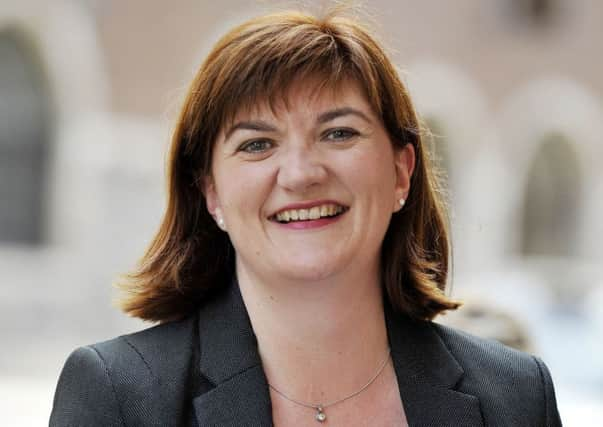Morgan to suggest move back to formal testing of seven-year-olds


In what is billed as her first major policy speech since the election, Mrs Morgan will signal a rethink of Key Stage One evaluations that could see them standardised nationally again.
She will also confirm that a new National Teaching Service (NTS) is being created, recruiting 1,500 of the “brightest and best” teachers by 2020 to work in the toughest schools.
Advertisement
Hide AdAdvertisement
Hide AdThe individuals will stay with schools for up to two years, and receive fast-track promotion opportunities as an incentive to take part in the scheme. Mrs Morgan will tell an event hosted by the Policy Exchange think-tank that the coalition government “raised standards and heightened expectations”. But she will also highlight local authorities Where the majority of pupils are still not securing five good GCSEs.
She will also stress the importance of “reception baseline” assessments in reception class and “more rigorous” SATs at the end of primary school. But she will also point to the importance of having robust tests at age seven. “The Government will be working with head teachers in the coming months on how to get this right, holding schools to account and giving them full credit for the progress they achieve,” a Department for Education spokeswoman said.
Standardised national tests for pupils in year two were dropped in 2004, with schools in England given responsibility for assessing levels in literacy, writing, maths and science.
Mrs Morgan will also confirm that children who fail to grasp basic literacy and numeracy at primary school will have to resit tests at secondary. She said: “For all we’ve achieved, too many young people aren’t being given a fair shot to succeed because of where they live. That’s why today I’m announcing the creation of a National Teaching Service - sending some of our best teachers to schools in struggling areas.
Advertisement
Hide AdAdvertisement
Hide Ad“At the same time we’re taking further steps to ensure that every pupil masters the three Rs in primary school and studies the core academic subjects in secondary school - ensuring that every young person gets the best start in life.”
Kevin Courtney, the deputy general secretary of the National Union of Teachers said: “It is quite staggering the degree to which the Government is unable to understand how their approach to the measurement of the performance of schools, and the system as a whole, is turning schools into exam factories. Time and again the Government’s accountability agenda mistakes extra testing for better learning.
“The UK already has the most excessively tested children in the whole of Europe. Parents, teachers and head teachers will be alarmed to see the latest proposals from Nicky Morgan which suggests bringing back SATs for seven-year-olds a decade after their abolition. Children and young people urgently need the formal assessment burden on them reduced. More tests at seven, involving the labelling and grading of young children, is simply the very last thing that is needed to help improve outcomes or learning.”
Shadow education secretary Lucy Powell said: “For all their talk of standards, the Tories’ record on education is poor. Nothing is more important in education than having excellent teachers in all our schools, but this Government has created chronic shortages, with the highest number now quitting the profession since records began and missed recruitment targets year on year.
Advertisement
Hide AdAdvertisement
Hide Ad“Rather than drive up standards, they have created a schools policy that has allowed the attainment gap between poorer children and their peers to widen, teacher shortages particularly in subjects that are key to our country’s competitiveness such as English and maths, and pushed post-16 education to a cliff edge, limiting opportunities for the next generation.”